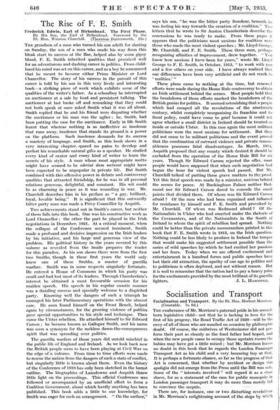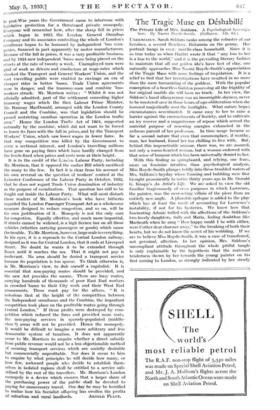Socialisation and Transport
Socialisation and Transport. By the Rt. Hon. Herbert Morrison, _ (Constable. 7s. 6d.)
THE exuberance of Mr. Morrison's paternal pride in his-second- born legislative child—not that he- is lacking in 'love for the first of his progeny, the Road Traffic Act of 1980---Lwill be the envy of all of those who are assailed on occasion by philosophic doubt. Of course, the midwives of Westminster did not.per- form their part as cleanly as the fond father had hoped, and When the new people came to occupy those. upstairs rooms the . babies may. have. got a little mixed.; but-Mr:- Morrison leaVeS no doubt in this book that he regards the London Passenger Transport Act as his child and a .very bouncing .boy at that. It is perhaps a fortunate chance, so far .as the-progress of that Act is concerned, that whether by accident or. design this apologia did not emerge from the-Press until the-Bill was safe. Some of the " interests involved '.' will _regard it. as a close shave, for as a statement-of -the -case for public monopoly in London passeriger.transport it may do more than merely fail
to convince the-seeptic. _ - -
There are, for instance, one or- two disturbing revelations in Mr. Morrison's enlightening -account ,of,the steps by which in post-War years, the Government came to intervene -with legislative protection for: a threatened private monopoly, Everyone will remember how, after the sharp fall in prices which began in 1920, .the- London General .Omnibus Company and' its associates controlling.the whole of London's omnibuses began to be harassed by independent 'bus com- panies, financed in part apparently by motor manufacturers: Because of-the fall in prices, it was a very profitable business; and by 1924 new independent 'buses-were being placed on the streets at the:rate of twenty a week. Unemployed men were glad of work as drivers and conductors at wage-rates which shocked the Transport and, General Workers' Union, and the vast travelling public were enabled to envisage an era of cheaper rides in better 'buses. Trade Union agreements were -in danger, and the tramway-men and combine 'bus- workers struck.. Mr. Morrison writes : -" Whilst it was not officially admitted, part of the settlement conceding• higher tramway wages which the then Labour Prime Minister, Mr. Ramsay MacDonald; arranged with the London County Council and the Combine, was that legislation should be passed restricting omnibus operation in the London traffic area." Hence the London Traffic Act of 1924, supported naturally by the combine, which did not want to be forced to lower its fares with-the fall-in prices, and by-the Transport Workers' Union, which saw lower wages in lower fares. In that way competition was killed by . the Government to serve a sectional interest, and London's travelling millions have gone on paying fares which have hardly changed from the levels fixed when prices and costs were at their height.
It is to the credit of. the IzAulort Labour Party, including Mr. Morrison, that it opposed the earlier Bill which sacrificed the many to the few. In fact it is clear from his account of his own reversal on the question of workers' control at the Leicester Conference of the Labour Party in October, 1932, that he does not regard Trade Union domination of industry as the purpose of socialization. That question has still to be fought out inside the Labour Party. What will most disturb those readers of Mr. Morrison's book who have hitherto regarded the London Passenger Transport Act as a Nyholesome measure designed to reduce congestion, and so on, will be his own justification of it. Monopoly is not the only cure for congestion. Equally effective, and much more impartial, if streets cannot be widened, is a high licence tax on all those vehicles (whether carrying passengers or goods) which cause the trouble. To Mr. Morrison, however, large scale is everything. In his eyes, it is a reproach to the Central London railway, designed as it was for Central London, that it ends at Liverpool Street. No doubt he wants it . to be extended through Essex until it reaches the sea. That it might not pay is irrelevant. No area should be denied a transport service because its population is too sparse. To think otherwise is, in Mr. Morrison's view, to dub oneself a -capitalist: - It is essential that non-paying routes should be provided, and the new Act provides the means. There are busy routes, carrying hundreds of thousands of poor East End workers in crowded 'buses to their City work and their West End amusements. These must pay for the others. " It is notorious that at the height' of the competition between the. Independent omnibuses and the Combine; the important competition took place on the profitable routes going through Central London." If those profits were destroyed by com- petition which reduced the fares and provided more seats, the non-paying services ' in sparsely-populated (middle- class ?) areas will not be provided. Hence the monopoly. It would be difficult- to imagine a more arbitrary and less democratic system- of taxation. It does not apparently occur to Mr. Morrison to enquire whether a direct subsidy from public revenue would not be a less objectionable method of securing transport services which are socially desirable but commercially unprofitable. Nor does it occur to him to enquire by what principles he will decide how many, or how few, awkward people who decide to establish them- selves in isolated regions shall be entitled to a service sub- sidized by the rest of the travellers. Mr. Morrison's London monopoly is a device which ensures that a larger share of the purchasing power of the public shall be devoted to Paying for unnecessary travel. One day he may be horrified to realize how his Socialist offspring has swollen the profits of suburban -and rural. landlords. ARNOLD PLANT%











































 Previous page
Previous page